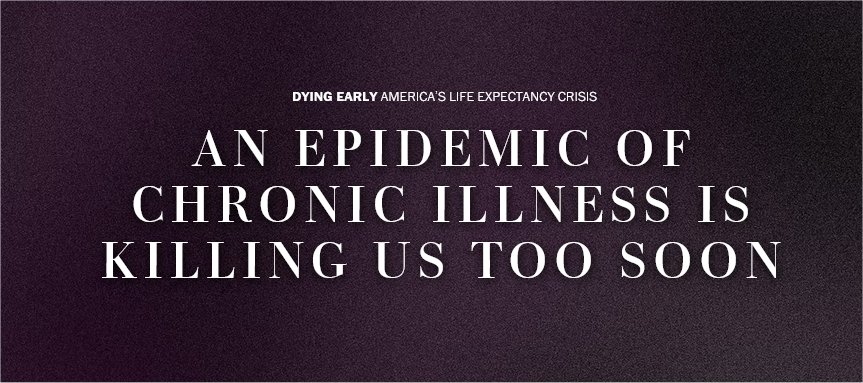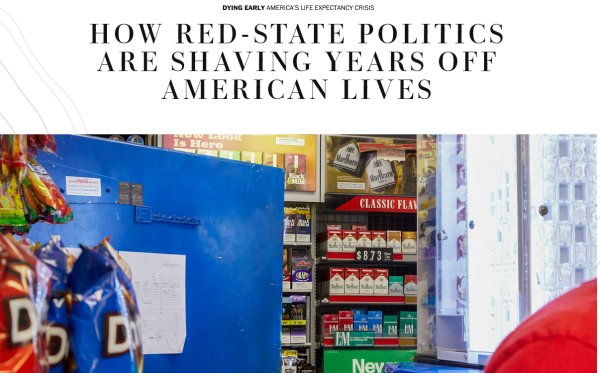- Veritasium on cognitive ease;
- How the world views the US’s disarray (due invariably to Republicans);
- How a century ago in France, smelling bad was a good thing; how standards about hygiene have changed;
- Two WaPo pieces about the decline of life expectancy in the US… due to Republican policies;
- And an NPR station manager in North Carolina who won’t allow broadcasts of Met operas that she deems non-Biblical.
Veritasium on Facebook: Cognitive Ease and the Illusion of Truth
Just mention something a few times, and claims you make about it will more likely be believed. Authoritarians and pastors count on this. Here’s the end of the video:
Cognitive ease is useful for being creative and intuitive, but it also makes you more gullible. So, for the written part of your driving test, going with your gut is probably a good strategy. But it areas like physics, where the answers are counter-intuitive and there are many common misconceptions, it’s important to be more skeptical.
This vigilance takes effort, and it’s also associated with being unhappy. Have you ever noticed that some of the best scientists and analytical minds are grumpy and suspicious of everything? I think this could be more than poor social skills. It may be essential for them to do their job. And this is the paradox of learning and critical thinking. Cognitive ease is pleasant, it is effortless, familiar, and it really does make you more creative and intuitive. But it can also trick you. It may make things seem true that aren’t, and you may feel like you’re learning when you’re not. On the other hand, being skeptical and analytical takes more mental work, it’s more confusing and it doesn’t feel as good, but it’s the best way to separate fact from fiction.
Now you may think that the point of this video is to say that we all need to think critically more often, but that’s not it. As an analytical thinker myself, I find it takes me like half an hour just to select a toothbrush. There are definitely times when cognitive ease is the appropriate mental state. I mean, we evolved it for a reason, so we can react intuitively in familiar everyday situations. Why think harder than you have to? So the key is to identify those times when more thought is required. But with sharing and repeating ideas easier than ever before, I think we need to be more vigilant to distinguish between those things that are really true and those we’ve simply heard many times before. The more something is repeated the more it starts to feel true.
Yet another example of how knowing about our cognitive biases doesn’t mean we should always work to avoid them. They evolved so that most intuitive everyday decisions are correct most of the time, without the delay and mental effort it would take to analyze every situation every time.
\\\

NY Times, news analysis by Peter Baker, 5 Oct 2023: To the World, McCarthy’s Exit Is Just Another Example of U.S. Disarray, subtitled “Amid upheaval on Capitol Hill and the undermining of democratic norms, the country’s institutions are under profound stress.”
The MAGA people who are certain the United States is the greatest nation ever don’t seem to realize how the US looks — due mostly to Republicans — to the rest of the world.
There was a time, not that long ago, when the United States presumed to teach the world how it was done. When it held itself up as a model of a stable, predictable democracy. When it sent idealistic young avatars to distant parts of the globe to impart the American way.
These days, to many watching at home and abroad, the American way no longer seems to offer a case study in effective representative democracy. Instead, it has become an example of disarray and discord, one that rewards extremism, challenges norms and threatens to divide a polarized country even further.
The ouster of the House speaker. Trump in court. A vocal G.O.P. minority holding up government funding.
\\\
One thing reading history — and for that matter, science fiction — does, is to let you appreciate how things change, and standards of other times were very different than our own.

Big Think, Livia Gershon, 4 Oct 2023: A century ago in France, smelling bad was a sign of health and vitality, subtitled “France’s notorious disregard for washing gradually changed as military authorities and public schools promoted a modern regime of cleanliness.”
The industrializing world changed in all sorts of remarkable ways. And, as historian Steven Zdatny writes, one way that would be immediately obvious if we could time-travel back to the mid-1800s, is the smells. Zdatny takes the example of France, where intense personal odors went from utterly unremarkable to completely unacceptable.
The industrializing world changed in all sorts of remarkable ways. And, as historian Steven Zdatny writes, one way that would be immediately obvious if we could time-travel back to the mid-1800s, is the smells. Zdatny takes the example of France, where intense personal odors went from utterly unremarkable to completely unacceptable.
In nineteenth- and early twentieth-century France, Zdatny writes, many people simply never washed. Peasants often considered dirt protective and sweat cleansing, and they viewed strong body odor as a sign of health and sexual vitality. In cities and suburbs, there was rarely an easy way to wash, even if you were so inclined, and no way at all to dispose of human waste in a sanitary fashion. In addition, body shame was a powerful force for people of all classes across the country, and some authorities warned that baths could lead to “evil thoughts.” These ideas didn’t die easily. One woman explained that, living in a Carmelite convent even as late as the 1930s, washing any part of the body besides the hands, face, and feet was viewed as “mortal sin.”
But, starting in the mid-nineteenth century, schools began teaching hygiene. It was slow going. A teacher at a village school in 1924 discovered that none of his students had ever used a toothbrush.
With examples about the French military, which lost the Franco-German war of 1870-1871, in part due to “recruits being physically unfit, partially because of a lack of hygienic practices.” So the military began cleaning up, and others followed. Officials cleaned canals and installed sewers. (Conservatives no doubt balked at the expense.)
But, gradually, millions of French families gained access to running water. The health effects were unmistakable. In particular, infant mortality fell 64 percent between 1901 and 1948.
Again, standards keep changing. In the last year or two there have been stories about how daily showers, including washing of hair, are not necessarily beneficial. They wash away useful oils. Just clean the parts that smell — armpits, groin, feet — every day.
\\
Once again, how the US is not at the top of world nations. One of a series of reports on this from WaPo.
Washington Post, Joel Achenbach et al, 3 Oct 2023: An epidemic of chronic illness is killing us too soon
The United States is failing at a fundamental mission — keeping people alive.
After decades of progress, life expectancy — long regarded as a singular benchmark of a nation’s success — peaked in 2014 at 78.9 years, then drifted downward even before the coronavirus pandemic. Among wealthy nations, the United States in recent decades went from the middle of the pack to being an outlier. And it continues to fall further and further behind.
A year-long Washington Post examination reveals that this erosion in life spans is deeper and broader than widely recognized, afflicting a far-reaching swath of the United States.
Not surprisingly, Red-State policies are implicated.
Washington Post, Lauren Weber, et al, 3 Oct 2023: How red-state politics are shaving years off American lives
The article begins with anecdotes about a hearse driver and the younger and younger people he takes to bury. The gist:
Americans are more likely to die before age 65 than residents of similar nations, despite living in a country that spends substantially more per person on health care than its peers.
Many of those early deaths can be traced to decisions made years ago by local and state lawmakers over whether to implement cigarette taxes, invest in public health or tighten seat-belt regulations, among other policies, an examination by The Washington Post found. States’ politics — and their resulting policies — are shaving years off American lives.
This isn’t just about Covid and vaccines.
State lawmakers gained autonomy over how to spend federal safety net dollars following Republican President Ronald Reagan’s push to empower the states in the 1980s. Those investments began to diverge sharply along red and blue lines, with conservative lawmakers often balking at public health initiatives they said cost too much or overstepped. Today, people in the South and Midwest, regions largely controlled by Republican state legislators, have increasingly higher chances of dying prematurely compared with those in the more Democratic Northeast and West, according to The Post’s analysis of death rates.
And this was probably true in France, too. Fortunately, eventually, the conservatives lost. The article goes on about Republican resistance to various health measures.
\\
This is cute. The general manager of an NPR station in North Carolina is refusing to air broadcasts of non-biblical operas.

NPR, 5 Oct 2023: Radio station faces swift backlash after it deems Met operas ‘inappropriate’ (via, with above pic)
I’m not going to quote. Just wondering, in the canon of great operas, how many of them were ever Biblically consistent? Let alone modern operas written by composers in our current multicultural world. This strikes me as yet another Christian uncomfortable with living in the modern world, trying to regulate world culture to her personal tastes. On “National” Public Radio. She should go work at a Christian radio station.

 />
/>





